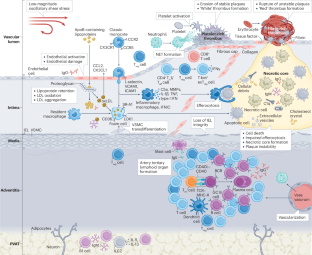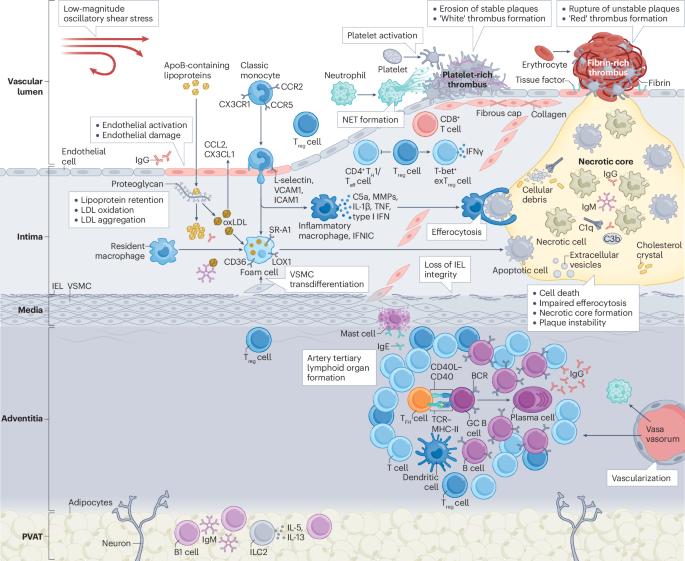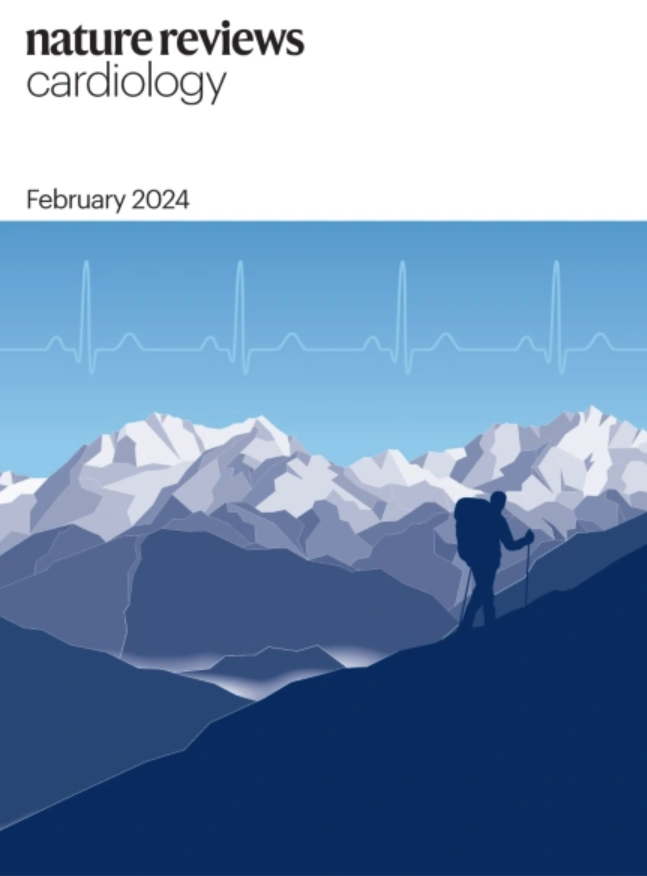自身免疫性疾病与动脉粥样硬化性心血管疾病
IF 41.7
1区 医学
Q1 CARDIAC & CARDIOVASCULAR SYSTEMS
引用次数: 0
摘要
自身免疫性疾病与动脉粥样硬化性心血管疾病及其临床表现的风险急剧增加有关。这种风险的增加与动脉粥样硬化的发生受保护性和疾病促进性免疫机制的调节这一观点是一致的。值得注意的是,仅靠血脂异常和高血压等传统心血管风险因素并不能解释自身免疫性疾病导致的心血管疾病风险增加。有几种机制与介导自身免疫相关心血管疾病风险有关,它们或直接作用,或在复杂的相互作用中调节其他风险因素的影响。白细胞功能异常和促炎细胞因子是这两种疾病的核心因素,它们会导致血管功能障碍、炎症消退受阻和慢性炎症加剧。同样,对自身抗原耐受性的丧失和自身抗体的产生是自身免疫的主要特征,但也与动脉粥样硬化性心血管疾病期间的不良炎症反应有关。因此,免疫调节疗法是直接降低心血管疾病风险的潜在有效干预措施,而自身免疫性疾病活动的生物标志物可能是根据心血管风险对自身免疫患者进行分层的相关工具。在这篇综述中,我们将讨论与自身免疫相关的心血管风险增加的病理生理学方面,并强调开发专门针对这一尚未满足的临床需求的新型疗法需要回答的许多未决问题。本文章由计算机程序翻译,如有差异,请以英文原文为准。


Autoimmune diseases and atherosclerotic cardiovascular disease
Autoimmune diseases are associated with a dramatically increased risk of atherosclerotic cardiovascular disease and its clinical manifestations. The increased risk is consistent with the notion that atherogenesis is modulated by both protective and disease-promoting immune mechanisms. Notably, traditional cardiovascular risk factors such as dyslipidaemia and hypertension alone do not explain the increased risk of cardiovascular disease associated with autoimmune diseases. Several mechanisms have been implicated in mediating the autoimmunity-associated cardiovascular risk, either directly or by modulating the effect of other risk factors in a complex interplay. Aberrant leukocyte function and pro-inflammatory cytokines are central to both disease entities, resulting in vascular dysfunction, impaired resolution of inflammation and promotion of chronic inflammation. Similarly, loss of tolerance to self-antigens and the generation of autoantibodies are key features of autoimmunity but are also implicated in the maladaptive inflammatory response during atherosclerotic cardiovascular disease. Therefore, immunomodulatory therapies are potential efficacious interventions to directly reduce the risk of cardiovascular disease, and biomarkers of autoimmune disease activity could be relevant tools to stratify patients with autoimmunity according to their cardiovascular risk. In this Review, we discuss the pathophysiological aspects of the increased cardiovascular risk associated with autoimmunity and highlight the many open questions that need to be answered to develop novel therapies that specifically address this unmet clinical need. In this Review, Porsch and Binder discuss the evidence for and mechanisms of the increased and premature risk of atherosclerotic cardiovascular disease in patients with autoimmune disease, with particular focus on systemic lupus erythematosus and rheumatoid arthritis.
求助全文
通过发布文献求助,成功后即可免费获取论文全文。
去求助
来源期刊

Nature Reviews Cardiology
医学-心血管系统
CiteScore
53.10
自引率
0.60%
发文量
143
审稿时长
6-12 weeks
期刊介绍:
Nature Reviews Cardiology aims to be the go-to source for reviews and commentaries in the scientific and clinical communities it serves. Focused on providing authoritative and accessible articles enriched with clear figures and tables, the journal strives to offer unparalleled service to authors, referees, and readers, maximizing the usefulness and impact of each publication. It covers a broad range of content types, including Research Highlights, Comments, News & Views, Reviews, Consensus Statements, and Perspectives, catering to practising cardiologists and cardiovascular research scientists. Authored by renowned clinicians, academics, and researchers, the content targets readers in the biological and medical sciences, ensuring accessibility across various disciplines. In-depth Reviews offer up-to-date information, while Consensus Statements provide evidence-based recommendations. Perspectives and News & Views present topical discussions and opinions, and the Research Highlights section filters primary research from cardiovascular and general medical journals. As part of the Nature Reviews portfolio, Nature Reviews Cardiology maintains high standards and a wide reach.
 求助内容:
求助内容: 应助结果提醒方式:
应助结果提醒方式:


